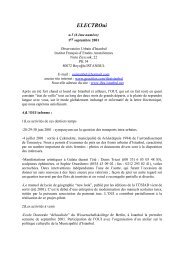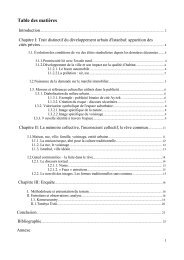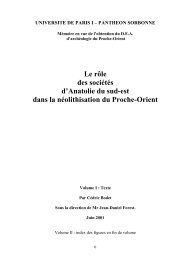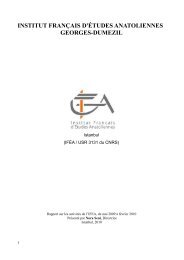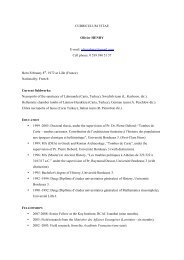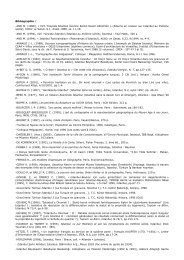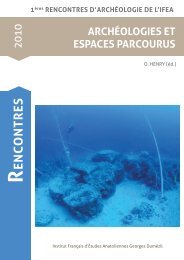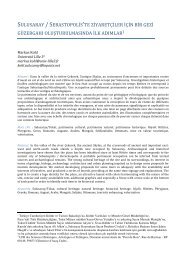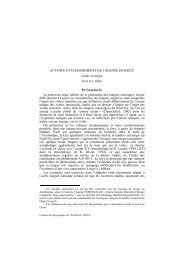ELECTROui n.6 (7 ème numéro) 10 octobre 2001 ... - IFEA
ELECTROui n.6 (7 ème numéro) 10 octobre 2001 ... - IFEA
ELECTROui n.6 (7 ème numéro) 10 octobre 2001 ... - IFEA
Create successful ePaper yourself
Turn your PDF publications into a flip-book with our unique Google optimized e-Paper software.
ISBN:0-85255- 274-2|£40.00 - ClothISBN:0-85255-279-3|£16.95 - PaperPublication Date:17/5/<strong>2001</strong>This book, based on fieldwork carried out between 1983 and 1999, explores contemporary social identities in alittle known region of Turkey's eastern Black Sea coast abutting the Republic of Georgia. Recent developmentshave included the promotion of tea as a cash crop, disappointments in this market, and the opening of the bordercrossing to Georgia shortly before the collapse of the Soviet Union. These are analysed in the context of moregeneral changes in Turkish civil society and widespread doubts about the continued viability of the secularinstitutions of AtatŸrk's republic. Ethnicity is one significant aspect of social identities in this region. Mostpeople acknowledge some form of identity as Lazi and many speak Lazuri, a language that is related toGeorgian, not Turkish. The self identifications of Lazuri speakers themselves do not, however, endorse theweight currently given to ethnicity by many Western scholars, as well as some intellectuals elsewhere in Turkey.Religion seems much more significant. Like the other groups in this region, most Lazi are strongly committed toIslam, but critical of recent fundamentalist trends. They combine this with strong loyalty to their nation andappreciation of all that the secular state us done to modernize' and integrate' this region over the last half century.The volume makes a significant contribution to the anthropological literature on Turkey and the Middle Easternand Black Sea regions. It will also appeal to Turkish specialists in other disciplines and to all those interested incurrent debates in the social sciences about identity, ethnicity and globalization.Ildik— Bell r-Hann is Lecturer in Turkish studies, Martin Luther University, Halle Chris Hann is Director of theMax Planck Institute for Social Anthropology, HalleIntroduction State Market Civil society Patriarchy Marriage Islam, I Islam, II Identities Civilization or culture?BibliographySeries: World Anthropology ; Co-publishersUS & Canada: School of American Research PressPP:About 320|Illustrations: photos maps|Format: 234 x 156En vrac :-HACISALİHOĞLU İ.Y. (2000), Küreselleşme Mekânsal Etkileri ve İstanbul (les effetsspatiaux de la globalisation et Istanbul), İstanbul : Akademik Düzey Yayınları.-ÇORUK A.Ş. (hazırl) (<strong>2001</strong>), Balıkhane Nazırı Ali Rıza Bey : Eski Zamanlarda İstanbulHayatı, İstanbul : Kitabevi Yayınları, Anı, 442 p.-S.İ., OZLER, Turkish Foreign Policy, « Politics of the Gecekondu in Turkey : The PoliticalChoises of Urban Squatters in National Elections », Vol.1, N.2, Fall 2000.-P.Sanat Kültür Antika Dergisi, N.22, Eylül <strong>2001</strong>, « İstanbul’un Su Efsaneleri » ve « İstanbul’un Su yolları » ;www.pdergisi.com2)Adresses utiles :--Une bibliothèque utile sur les questions économiques : celle de la Türk Ekonomi Bankası, àFındıklı (Beyoğlu). Horaires : <strong>10</strong>h-16h, lundi-vendredi. Des dossiers sur différentes questionssont disponibles.-On peut se contenter de faire référence à un texte sur « Istanbul globalisé », qui rejoint lespréoccupations du programme Le Caire-Téhéran-Istanbul. Voici le site où se trouve tout untravail de réflexion sur la globalisation et les villes globales avec P. Taylor en chef d’orchestrehttp://www.lboro.ac.uk/gawc/-Accès à la presse turque avec moteur de recherche : www.garildi.com.tr-Revue İLERİ : www.ileri2000.org



